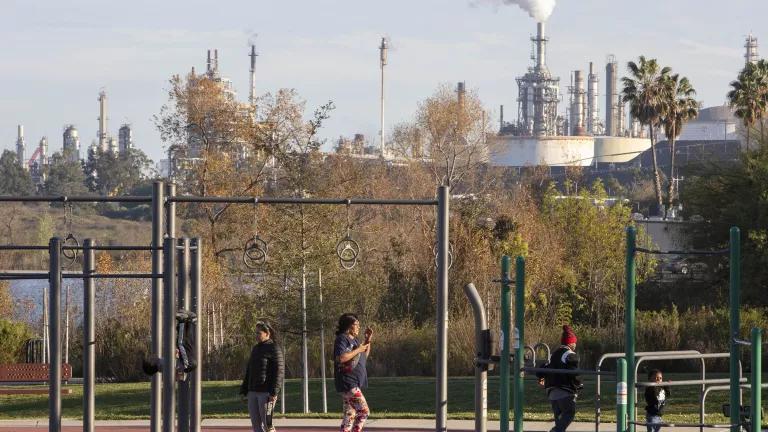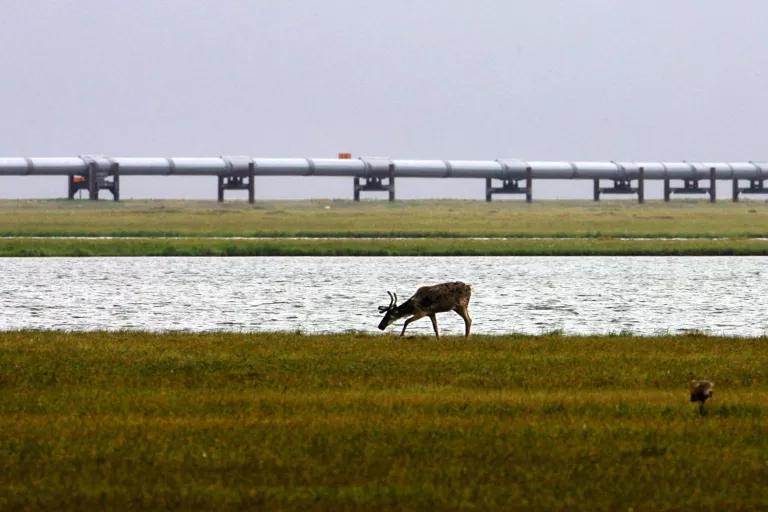With His “Climate Day” Orders, Biden Moves to Protect the Country—Its People, Lands and Waters, and Science
National security, environmental justice, scientific integrity, and the economy are just a few issues covered by the president’s sweeping climate strategy.

A playground in Ken Malloy Harbor Regional Park near a Rio Tinto refinery and shipping operation and the Port of Los Angeles, February 20, 2020
What a difference a week makes.
In his first seven days as president, Joe Biden has taken swift action to combat the climate crisis. Within his first 12 hours on the job, he moved to rejoin the Paris Agreement, rescinded the permit for the Keystone XL pipeline, and issued a moratorium on oil and gas drilling in the Arctic National Wildlife Refuge.
On Wednesday—what’s been dubbed “Climate Day”—he went even bigger.
Here’s a look at some of the things Biden’s omnibus executive order on climate change will do.
Prioritize Environmental Justice
President Biden directed all relevant federal agencies “to develop programs, policies, and activities to address the disproportionate health, environmental, economic, and climate impacts on disadvantaged communities” and to adopt a “whole-of-government approach to addressing current and historical environmental injustices.” Two newly established bodies—the White House Environmental Justice Interagency Council and the White House Environmental Justice Advisory Council—will help carry out these goals, and one new initiative, known as Justice40, will work to deliver 40 percent of all benefits of federal climate investments to at-risk communities. “For far too long, the low-income communities and people of color who’ve done the least to contribute to the climate crisis have been the very ones suffering the most,” says NRDC President and CEO Mitch Bernard. With this order, the administration is taking the first steps toward redressing this inequity.
Recognize Climate Change as a National—and Global—Security Issue
In an effort to reclaim the country’s position as a global climate leader, the order sets a date of April 22 for the United States to host an Earth Day Leaders’ Climate Summit, which will be organized by John Kerry, who holds the recently created Cabinet-level position of special presidential envoy for climate. The order makes climate change a central organizing principle of U.S. foreign policy. The order also instructs the director of national intelligence to study and report the national security implications of climate change, directs “all agencies to develop strategies for integrating climate considerations into their international work,” and tells the State Department to begin the process of ratifying the Kigali Amendment to the Montreal Protocol, an international agreement to reduce hydrofluorocarbons in the atmosphere. Taken together, these actions, says Brendan Guy of NRDC’s International Program, “send another powerful signal that the United States is back, reengaged, and ready to lead again in the global race to achieve net zero emissions by midcentury—a goal that will help the world avoid climate catastrophe.”

End New Oil and Gas Leases
Biden’s executive order places a moratorium on any new leases of public lands and offshore waters until federal leasing policies have undergone a thorough review. The order also directs the secretary of the U.S. Department of the Interior to “identify steps that can be taken to double renewable energy production from offshore wind by 2030.” The pause in new drilling leases, says Josh Axelrod of NRDC’s Nature Program, “gives the country a chance to modernize the way we deploy our natural resources for developing energy—and to speed up a just and equitable transition to good-paying clean energy jobs of the future.”
Preserve Nearly a Third of U.S. Lands and Waters Over the Next Decade
Scientists warn that preventing mass extinction and warding off the most damaging effects of climate change would require conserving at least 30 percent of the planet’s lands and waters by the year 2030. President Biden’s order formalizes the administration’s commitment to this goal and, in a step toward achieving it, establishes “a process for stakeholder engagement from agricultural and forest landowners, fishermen, tribes, states, territories, local officials, and others to identify strategies that will result in broad participation.”
In addition, Biden calls for the formation of a Civilian Climate Corps—modeled after Franklin D. Roosevelt’s Civilian Conservation Corps and John F. Kennedy’s Peace Corps—to “put a new generation of Americans to work conserving and restoring public lands and waters, increasing reforestation, increasing carbon sequestration in the agricultural sector, protecting biodiversity, improving access to recreation, and addressing the changing climate.” Conservation efforts such as these will benefit “rural communities, tribal nations, and others on the frontlines of preserving nature,” says Andrew Wetzler of NRDC’s Nature Program, while at the same time “ensuring that all Americans—no matter their economic status or race—have access to the natural world.”
Elevate Science
Biden also issued a presidential memorandum directing all federal agencies “to make evidence-based decisions guided by the best available science and data.” After four years in which agencies led by Donald Trump ignored science and instead let corporate interests dictate environmental policy, such a directive is—sadly—now required to return science to its proper role in “the development and iterative improvement of sound policies, and to the delivery of effective and equitable programs,” as the White House puts it. NRDC climate and health scientist Vijay Limaye, PhD, heralds the move away from corporate and political influence in the crafting of policy. “Corporations should not be able to block critical safeguards and stifle public input to pad their own profits,” he says. “There’s no Republican air or Democratic air.”
This NRDC.org story is available for online republication by news media outlets or nonprofits under these conditions: The writer(s) must be credited with a byline; you must note prominently that the story was originally published by NRDC.org and link to the original; the story cannot be edited (beyond simple things such as grammar); you can’t resell the story in any form or grant republishing rights to other outlets; you can’t republish our material wholesale or automatically—you need to select stories individually; you can’t republish the photos or graphics on our site without specific permission; you should drop us a note to let us know when you’ve used one of our stories.


What Biden Should Get Done on Day One (or Close to It)
Mapping Urban Heat Islands Is Helping These Neighborhoods Adapt
Failing to Meet Our Climate Goals Is Not an Option